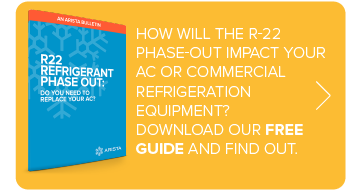Finding water anywhere it doesn’t belong in your house is a major cause for concern. Not only are you worried about where the leak is coming from (and how much it will cost to fix it!) but you’re also concerned about damage to your home. When it’s your air conditioner leaking water inside, you need to act fast to prevent water damage as well as expensive repair bills.
We know you’re reading this because you want to know why your AC is dripping water. But before you try to figure out why, TAKE THESE STEPS FIRST to prevent or at least minimize damage:
- TURN OFF THE AC SYSTEM. This is essential to stop the water flow and also protect your equipment from further damage.
- Clean up the water that’s leaked to prevent damage to walls, floors, ceilings and even furniture and decor in your home. Use a shop vac if it’s a lot of water.
Reasons for an air conditioner leaking water inside
These are the most common reasons why your air conditioner is leaking water inside the house:
- Condensate drain line clogged
- Drain line disconnected
- Drain pan clogged or rusted through
- Condensate pump malfunctioning
- Evaporator coil frozen (due to a clogged filter or refrigerant leak)
- Coils dirty or damaged
Given these common causes, when you’re looking for the source of your AC dripping water, you want to take a look at the coils and the drain line on your air conditioner’s inside unit (also known as the air handler).
Let’s explore the causes in more depth, and you’ll likely to be able to easily identify the cause of your air conditioner leaking water inside. And we’ll tell you what to do next in each case.
Drain line problems & your AC dripping water
Issues with the condensate drain line are the most common cause of an air conditioner leaking water inside the house.
As you may know, the way your air conditioner cools is by removing water vapor from the air, which condenses into water (called “condensate”). When the system works as it should, the condensate collects on the evaporator coil and flows down through the drain line.
So, the drain line is a primary suspect when it comes to water leaks. If it gets clogged with dirt and debris (which are carried into the line along with the condensate) the backup can cause leaks or a rupture of the line.
Another possible drain line issue: if your installers didn’t do a great job, the drain line might not be securely connected. Vibrations can cause it to come loose and result in your air conditioner leaking water inside the house.
WHAT TO DO NEXT: If cut-rate installers can mess up a drain line installation, take this as your cue to avoid trying this yourself. Get it repaired by properly trained professionals to avoid future water leaks.
Pan and pump issues can cause water leaks
If your inside air conditioner unit (air handler) is located in the basement, your drain line may empty condensate into a drain pan which is then pumped out by a condensate pump.
(If it’s in an attic or crawl space, chances are you have a gravity drain line carrying condensate outside, and you won’t have this issue. You can skip ahead to the next section!)
This type of setup can lead to your air conditioner leaking water inside the house in a couple of ways:
- An older drain pan can get rusted and develop holes and cracks
- The condensate pump can break down, causing the pan to overflow
WHAT TO DO NEXT: If you’re handy you may be able to replace a rusted pan. You’ll need to call in the pros to replace the pump.
Frozen coils & AC water leaks
Are you seeing a layer of frost or ice on the evaporator coils? This is a major cause for concern because if your unit keeps running too long in this condition, you can end up with a fried compressor, which is very expensive to fix. And you might need to replace the entire unit.
This is the only case where the air conditioner leaking water inside the house can be a good thing, if it alerts you to the problem in time to prevent compressor failure. That’s why it’s essential to turn off the system immediately!
Frozen coils happen for a variety of reasons, but the two most common are:
- reduced airflow over the coils, often resulting from a clogged air filter
- a refrigerant leak
WHAT TO DO NEXT: You must call in a reliable professional in this case. Learn more from these related articles:
AC Troubleshooting: Frozen HVAC System? Don’t Let it Go
R22 Refrigerant Phase Out: Do You Need to Replace Your AC?
Do you have older HVAC or commercial refrigeration equipment? Due to EPA regulatory changes, R22 refrigerant (the standard used to power AC for decades) is being phased out as of January 2020. Get informed about how this change impacts you with this information bulletin

Dirty & damaged coils can cause water to drip
Have you been neglecting your yearly AC maintenance? If they haven’t been cleaned in a while, your AC coils are probably getting covered in a lot of dust and grime. Or, the insulation on the outside of the coils can be cracked or damaged. In both cases, the condensate might not be able to run down the coils into the drain line as it’s supposed to. Instead, it gets diverted by the holes in the insulation and by the accumulated debris, and it drips off the coil rather than running into the condensate line.
If you’re seeing small drips and puddles rather than a large amount of water, look for telltale drips coming off the evaporator coil.
WHAT TO DO NEXT: In this case, you’re lucky: you just need a good coil cleaning and/or insulation replacement. If you know what you’re doing, cleaning coils isn’t too difficult. But if not we recommend leaving this job to the pros, because you can damage the sensitive coil fins if you use to wrong cleaning products or the wrong technique.


